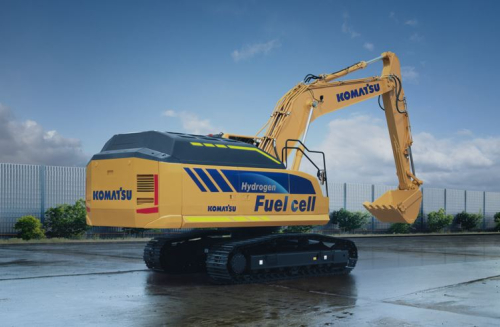
In its mid-term management plan, Komatsu committed to minimizing environmental impact through its business, targeting a 50% reduction in CO2 emissions from use of its products and production of its equipment by 2030 (compared to 2010 levels) and a challenge target of achieving carbon neutrality by 2050.
To help its customers achieve carbon neutrality, Komatsu has been providing a variety of products, services, and solutions that reduce environmental impact, such as hybrid hydraulic excavators and electric mini excavators. Komatsu is also engaged in research and development to provide products equipped with new power sources.
For the concept machine, Komatsu applied a hydrogen fuel cell system and hydrogen tank produced by Toyota Motor Corporation to Komatsu's medium-sized hydraulic excavator. In addition to Komatsu’s comprehensive control technology, the combination of Toyota’s hydrogen fuel cell system and Komatsu key components, Komatsu is working toward zero exhaust emissions and a significant reduction in noise and vibration, while delivering the same powerful digging performance and high operability as engine-driven excavators.
Medium-sized and large construction equipment requires a power source with higher energy density than that of small construction equipment. Because hydrogen has a higher energy density and can be refueled in a shorter time than recharging batteries, Komatsu has been advancing its hydrogen R&D efforts as a promising electrification choice for medium-sized and large models.
To contribute to realizing a hydrogen society and carbon neutrality, Komatsu will continue its efforts toward the commercial production of medium-sized and large construction machinery equipped with hydrogen fuel cells by conducting PoC tests of this new concept machine.